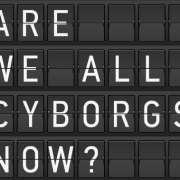The Summer 2023 issue of Salvo Magazine is now on its way to the mailboxes of subscribers (if you do not subscribe, you can fix that by going here).
The Summer 2023 issue of Salvo is now online! Featuring articles from James Kushiner, Terrell Clemmons, Robin Phillips, Rick Reed, Joshua Pauling, John Martin, Nicole King, and many others! Visit it on our website at https://t.co/f7Qz3SieRO pic.twitter.com/JLc5G2iPQr
— Salvo (@salvomagazine) June 26, 2023
This issue includes an article I wrote on the false equivalences between humans and machines that emerged in the wake of ChatGPT.
I point out that when a car can run faster than us, we don’t start thinking that the car might have personhood; when a forklift can lift more pounds than us, we don’t start thinking the forklift is sentient or has agency. Similarly, it is equally fallacious to think that because computers can out-perform humans at information processing that computers must therefore be spiritual, sentient, conscious, or possess agency or personhood. Yet as soon as chat-GPT became public, a growing body of thought began to develop based on the theory that bots were alive and possessed consciousness.
Drawing on my experience becoming enslaved to a bot and having had my brain nearly eaten by AI, I argue that the real danger we should be worried about is not machines becoming like humans, but humans becoming like machines. I argue that in a world where people increasingly look to computers as the model for true objectivity, there may be great temptation to assume that machine intelligence is always preferable to organic, God-given intelligence. We already see a trend in this direction as theorists like Ray Kurzweil, Nick Bostrom, and David Chalmers argue that the difference between artificial intelligence and human intelligence is not qualitative but quantitative and that, consequently, the computer may eventually be able to do everything a human mind can do, only quicker. According to this way of thinking, the human brain is just a bad sort of computer.


